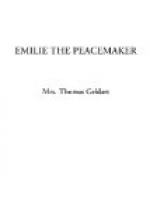Fred and his elder brother John were at home for the holidays; they were high-spirited lads of fourteen and fifteen years of age, and were particularly fond of teasing both their elder sisters and little Edith; a taste, by-the-bye, by no means peculiar to the Master Parkers, but one which we cannot admire, nevertheless.
The two boys, with Emilie and Edith, were on their way to pay aunt Agnes a little visit, having received from Mrs. Crosse, at the farm, a request for the honour of the young lady’s company as well as that of her brothers. John and Frederick were to walk, and Emily and Edith were to go in the little pony gig. As they were leaving the town, Edith caught sight of John coming out of a shop which was a favourite resort of most of the young people and visitors of the town of L——. It was professedly a stationer’s and bookseller’s, and was kept by Mrs. Cox, a widow woman, who sold balls, fishing tackle, books, boats, miniature spades, barrows, garden tools, patent medicines, &c., and who had lately increased her importance, in the eyes of the young gentlemen, by the announcement that various pyrotechnical wonders were to be obtained at her shop. There are few boys who have not at some time of their boyhood had a mania for pyrotechnics—in plain English, fire-works—and there are few parents, and parents’ neighbours, who can say that they relish the smell of gunpowder on their premises.
Mr. Parker had a particular aversion to amusements of the kind. He was an enemy to fishing, to cricketing, to boating; he was a very quiet, gentlemanly, dignified sort of man, and, although a kind father, had perhaps set up rather too high a standard of quietness and order and sedateness for his children. It is a curious fact, but one which it would be rather difficult to disprove, that children not unfrequently are the very opposites of their parents, in qualities such as I have described. Possibly they may not have been inculcated quite in the right manner; but that is not our business here.
Edith guessed what her brothers were after, and told her suspicious to Emilie; but not until they were within sight of the farm-house. John and Fred, who had been a short cut across the fields, were in high glee awaiting their arrival, and assisted Edith and her friend to alight more politely than usual. Aunt Agnes was in ecstasies of delight to see her dear Emilie, and she caressed Edith most lovingly also. Edith liked the old lady, who had a fund of fairy tales, such as the German language is rich in. Often would Edith go and sit by the old lady as she knitted, and listen to the story of the “Flying Trunk,” or the “Two Swans,” with untiring interest; and old ladies of a garrulous turn like good listeners. So aunt Agnes called Edith a charming girl, and Edith, who had seldom seen aunt Agnes otherwise than conversable and pleasant, thought her a very nice old lady.




